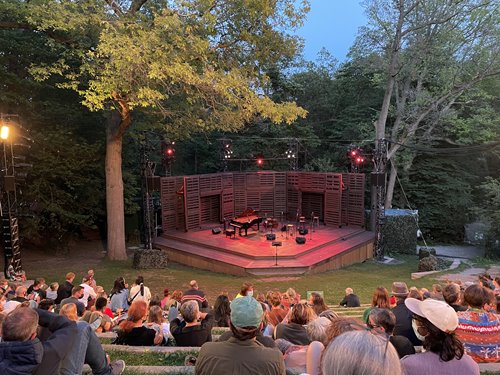By Eva Hellreich, Outreach and Events Coordinator, Neighborhood Arts Network
After 541 days, we were once again cloaked in song, thirst temporarily quenched.
I grew up in the West end of Toronto. Seeing Shakespeare in the Park in High Park was an annual tradition fostered by my family and later shared with friends and loved ones as I transitioned into adulthood. Eagerly waiting for the show to begin, seated on a blanket with a picnic and discreetly bottled wine, has been a summer staple for as long as I can remember.
 High Park Amphitheatre stage before the performance An Evening with Jeremy Dutcher. Photo: Tammaro
High Park Amphitheatre stage before the performance An Evening with Jeremy Dutcher. Photo: Tammaro
The High Park amphitheatre is unassuming, moonlight quietly joining the lighting crew and people of all ages sprawled on the grass, curious how an old story would once again be reimagined through a shared experience.
When March 2020 entered the room like a sleep paralysis demon that refused to let us wake, Torontonians lost access to the communal atmosphere that live entertainment offers. I felt sorrow for performers throughout the city who were navigating what felt like an eternal hiatus, as well as for audience members who lean on immersive storytelling to connect to the world. When summer 2021 arrived many of us were still unsure if we could safely enjoy live music or theatre together. So when Canadian Stage announced the live programming lined up for the High Park amphitheatre beginning in July, I was ecstatic that a tradition so close to my heart would see another summer.
Weeks later I was in the car when a CBC Radio- Reclaimed host was interviewing a charming soft spoken person who was laughingly sharing how excited they were to debut clothing by Indigenous designers at a three-day show series they had booked in High Park. My heart raced- it was Jeremy Dutcher. I immediately rushed to the website to book tickets.
Finally, after a month of willing the “X” on my calendar to draw nearer, the day of the show came. It was nerve wracking to be close to so many people for an extended period of time, despite the mask mandate and the show being outdoors; it can feel disorienting re-learning how to have shared experiences with strangers. Jeremy was an excellent teacher for this lesson, with four vocalists, a cellist, a saxophonist and a trumpeter on stage with him, as well as archival recordings of Wolastoq folk singers which were seamlessly integrated into songs reimagined to include the additional musicians. Engaging consistently with the audience - referring to us as “friend,” thanking us for sharing this experience with him - is something recorded music and virtual performances struggle to integrate. The sighs and chuckles of those seated next to me, the crickets, the wind in the trees cradling the stage, and Jeremy lovingly teasing his co-performers, became part of the performance and collective and deeply intimate experience.
When the second song started its steady climb to the brass climax, I found myself crying; partially due to a memory the song triggered of the last time I felt this free, with a group of friends waist deep in snow in the dead of winter while listening to Wolastoqiyik Lintuwakonawa, and also at the realization of how much being moved by connecting with others through art is part of my relationship with myself that has been in hibernation since the pandemic began.
Perhaps it was the tender advocacy for Indigenous folx and Mother Earth, or the night sky’s enthusiasm in bathing the performers in soft light, or feeling so fully immersed I could finally be still, but I left the show feeling like I had come home to myself and with immense gratitude for having been able to get a glimpse of Jeremy Dutcher in-person, someone whose energy is stardust singing you to sleep.
Thank you, Jeremy - an artist whose songs are all a glimpse at a better love.